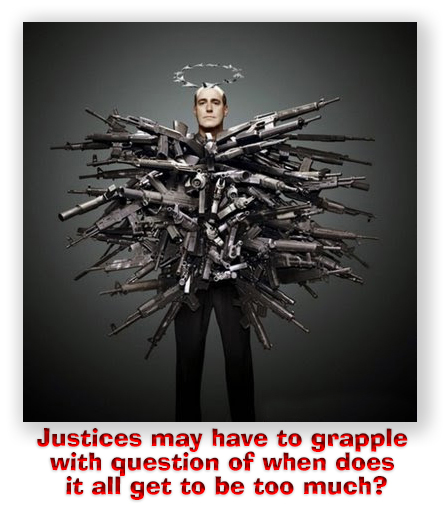We post news and comment on federal criminal justice issues, focused primarily on trial and post-conviction matters, legislative initiatives, and sentencing issues.

922(g) FELON IN POSSESSION CHALLENGES EXPLODE AFTER BRUEN
The Trace reported last week that 55% of over 2,000 federal court decisions citing New York State Rifle & Pistol Association v. Bruen over the past two years have challenged the constitutionality of 18 USC § 922(g)’s ban on felons possessing guns and ammo, “making it the single most frequently contested statute by far.”
 The latest example was handed down two days ago in United States v. Diaz. In that case, the 5th Circuit ruled that just being a felon was insufficient to make the application of 18 USC § 922(g)(1) consistent with the Second Amendment. But where the defendant had been convicted of a felony of theft, that “would have led to capital punishment or estate forfeiture” at the time the Second Amendment was ratified, “disarming [the defendant] fits within this tradition of serious and permanent punishment” and is thus constitutionally applied.
The latest example was handed down two days ago in United States v. Diaz. In that case, the 5th Circuit ruled that just being a felon was insufficient to make the application of 18 USC § 922(g)(1) consistent with the Second Amendment. But where the defendant had been convicted of a felony of theft, that “would have led to capital punishment or estate forfeiture” at the time the Second Amendment was ratified, “disarming [the defendant] fits within this tradition of serious and permanent punishment” and is thus constitutionally applied.
I will write more about Diaz on Monday. For now, back to the trendline:
The Trace reported that “at least 30 of the challenges to the felon gun ban have succeeded. While that ratio may seem small, it marks a stark departure from the past, when effectively none succeeded, and it shows that Bruen has cracked the longstanding consensus that people convicted of serious crimes may constitutionally be barred from gun ownership.”
When weighing the felon gun ban, judges have distinguished between violent and nonviolent offenses. But a former prosecutor told The Trace (an unapologetically anti-gun publication), that drawing the line is tough. “Who’s dangerous? What is your definition of dangerous? It’s easier to have a bright line. But that bright line is gone.”
Andrew Willinger, the executive director of the Duke Center for Firearms Law – which disseminates and supports reliable, balanced, and insightful scholarship and programming on firearms law – said it remains unclear whether banning gun possession among entire categories of people, like felons, is constitutional, particularly when their convictions were for nonviolent offenses that posed no obvious danger to the public.
“You’re really talking about categorical group determinations, rather than any kind of individualized finding of a threat of danger,” Willinger said. “And [United States v.] Rahimi doesn’t endorse [categorical prohibitions], but it also doesn’t rule them out, right?”
 No one can know how the Supreme Court will rule when the felon gun ban finally gets to the high court, although no one can doubt that it will. When Justice Amy Coney Barrett was a 7th Circuit judge, she wrote a dissent favoring restoration of gun rights to nonviolent felons. “That is probably the direction that the Supreme Court is headed if and when it takes up these cases,” Willinger said, “which I think it probably has to do at some point in the near future.”
No one can know how the Supreme Court will rule when the felon gun ban finally gets to the high court, although no one can doubt that it will. When Justice Amy Coney Barrett was a 7th Circuit judge, she wrote a dissent favoring restoration of gun rights to nonviolent felons. “That is probably the direction that the Supreme Court is headed if and when it takes up these cases,” Willinger said, “which I think it probably has to do at some point in the near future.”
The Trace, More Than a Thousand Felons Have Challenged Their Gun Bans Since the Supreme Court’s Bruen Decision (September 12, 2024)
United States v. Diaz, Case No. 23-50452, 2024 U.S. App. LEXIS 23725 (5th Cir., September 18, 2024)
– Thomas L. Root

























